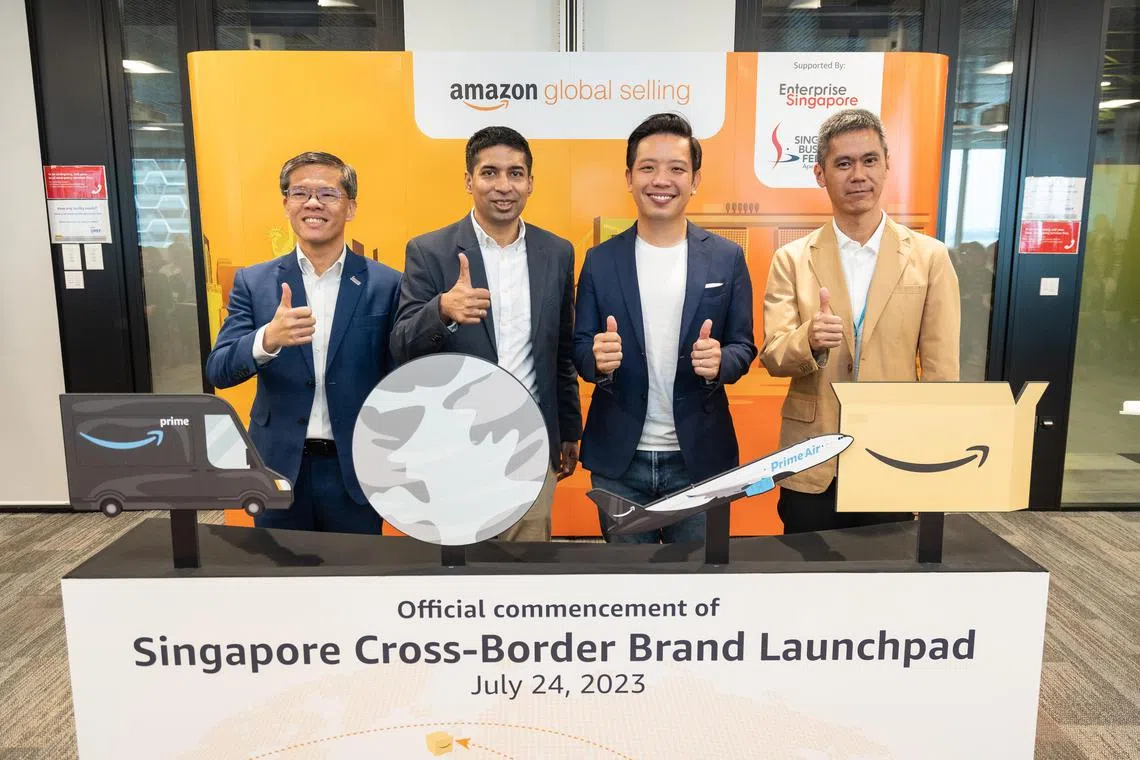New initiative to boost cross-border e-commerce for at least 300 Singapore firms
Sign up now: Get ST's newsletters delivered to your inbox

(From left) Singapore Business Federation CEO Kok Ping Soon, head of Amazon Global Selling South-east Asia Anand Palit, MOS for Trade and Industry Alvin Tan, and Enterprise Singapore's assistant CEO Soh Leng Wan.
PHOTO: AMAZON SINGAPORE
SINGAPORE - More micro, small and medium-sized enterprises (MSMEs) in Singapore will be receiving support to boost their cross-border e-commerce capabilities.
The new Amazon Global Selling Singapore Cross-border Launchpad programme, launched on Monday in collaboration with Enterprise Singapore and the Singapore Business Federation, will help more than 100 local Singapore MSMEs launch and scale their brands through Amazon’s Global Selling in the next two years.
Global Selling is a business unit that helps sellers trade internationally.
Through the programme, Amazon will provide dedicated account management support for the MSMEs, covering advisory on business growth and strategy, optimisation of marketing and analytics tools, and how to achieve product standards certification in line with local regulations.
The programme will also equip at least 300 Singapore MSMEs with cross-border e-commerce knowledge through seminars, business reviews, and business-matching.
Mr Anand Palit, head of Amazon Global Selling South-east Asia, said on Monday that cross-border e-commerce is becoming increasingly crucial to the success of MSMEs.
He said the global compound annual growth rate for e-commerce is projected to exceed 28 per cent between 2020 and 2027, highlighting it as a significant opportunity for Singapore’s MSMEs.
“Singapore’s sellers should definitely explore and actively consider cross-border e-commerce, because it allows them to grow their business organically and gain access to customers in other countries like the US,” he told The Straits Times.
According to a study by Access Partnership, which surveyed over 300 MSMEs in Singapore, 83 per cent of Singapore MSMEs believe that e-commerce is vital for their ability to export overseas.
The study also found that e-commerce export revenues in Singapore could more than double from $1.7 billion in 2022 to $3.9 billion by 2027 if MSMEs increase the rate at which they adopt e-commerce to export their products and services.
Local businesses are aware that they have to go global to scale up, said Minister of State for Trade and Industry Alvin Tan at the launch ceremony. “Apart from increasing their reach to a global audience, companies gain greater exposure to new opportunities and trends to remain relevant in a fast-changing market,” he said.
“E-commerce channels provide avenues for enterprises to explore new markets for growth and test product-market fit before establishing their physical presence overseas.”
According to Amazon, more than 60 per cent of sales on the e-commerce platform are from independent sellers, most of which are small and medium-sized businesses.
As at May, sales from Singapore sellers on Amazon global sites had achieved double-digit growth year on year. The platform did not provide further details on this.
Mr Aloysius Chay, co-founder of sports massage gun company Hydragun, said the Amazon Global Selling Singapore Cross-border Launchpad programme will help Hydragun reach its goal of reaching one million households by 2025.
“Plenty of MSMEs may struggle to understand the ins and outs of Amazon. This initiative will definitely help to accelerate the whole process and help MSMEs get sales on Amazon as quickly as possible,” he said.
Before setting up shop on Amazon in 2015, local skincare company Handmade Heroes had limited reach despite doing well in sales, said its co-founder and director Lynsey Lim.
“We were mostly in Singapore, and we were selling in pop-up markets and through our website. So it was really limited as there was only so much of an audience. Selling on Amazon really helped us to gain access to an international audience,” she said.



